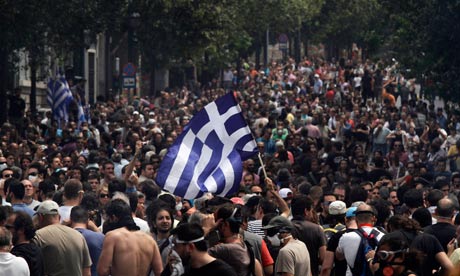Police fire teargas at Greek anti-austerity protest
ATHENS |
(Reuters) - Greek police fired teargas to disperse anti-austerity
protesters hurling stones and petrol bombs on the day of a general
strike that brought much of the near-bankrupt country to a standstill.It was the second time in three weeks that Greek workers had walked off the job, with Thursday's strike aimed at showing EU leaders meeting in Brussels that new wage and pension cuts will only worsen their plight after five years of recession.
-
More than 30,000 protesters gathered in central Athens as most business and public sector activity ground to a halt at the start of the 24-hour strike called by the country's two biggest labour unions, ADEDY and GSEE.
-
Tensions mounted when a small group of protesters began throwing pieces of marble, bottles and petrol bombs at police barricading part of the square in front of parliament, prompting riot police to fire several rounds of teargas to disperse them.
-
"Enough is enough. They've dug our graves, shoved us in and we are waiting for the priest to read the last words," said Konstantinos Balomenos, a 58-year-old worker at a water utility whose wage has been halved to 900 euros and who has two unemployed sons.
Some protesters were carrying Greek, Spanish and Portuguese flags and shouted: "EU, IMF out".
-
Greece is stuck in its worst downturn since World War Two and must make at least 11.5 billion euros of cuts to satisfy the "troika" of the European Commission, European Central Bank and IMF, and secure the next tranche of a 130-billion-euro bailout.
"Agreeing to catastrophic measures means driving society to despair and the consequences as well as the protests will then be indefinite," said Yannis Panagopoulos, head of the GSEE private sector union, one of two major unions that represent about 2 million people, or half of Greece's workforce.
-
LENDERS DEMAND AUSTERITY
European Union leaders will try to bridge their differences over plans for a banking union at a two-day summit which starts on Thursday. No substantial decisions are expected, reviving concerns about complacency in tackling the debt crisis which exploded three years ago in Greece.
The austerity policies being pursued in Europe's indebted Mediterranean countries at the behest of Germany and other rich euro zone members will drive the euro apart, protesters warned.
"This can't go on. We sure need measures but not as tough as the ones (German Chancellor Angela) Merkel is asking for," said Dimitris Mavronassos, a 40-year-old shipyard worker who has not been paid for six months.
The strike emptied streets and offices in Athens. Ships stayed in port, Athens public transport was disrupted and hospitals were working with emergency staff, while public offices, ministries, bakeries and other shops were shut.
Newspaper kiosk owners, lawyers, taxi drivers and air traffic controllers were among those protesting over the cuts, which include further drastic reductions in welfare and health spending.
Opinion polls show rising anger with the terms of the bailout keeping the economy afloat, and Greeks becoming increasingly pessimistic about their country's future.
"The new, painful package should not be passed," the ADEDY public sector union said in a statement.
"The new demands will only finish off what's left of our labour, pension and social rights."
But with Greece due to run out of money next month, Athens has little choice but to push through the austerity package being discussed with lenders.
Greece and inspectors from the troika say they have agreed on most issues. Athens is expected to secure aid needed to avoid bankruptcy given EU determination to avoid fresh market turmoil threatening bigger economies such as Spain and Italy.


No comments:
Post a Comment